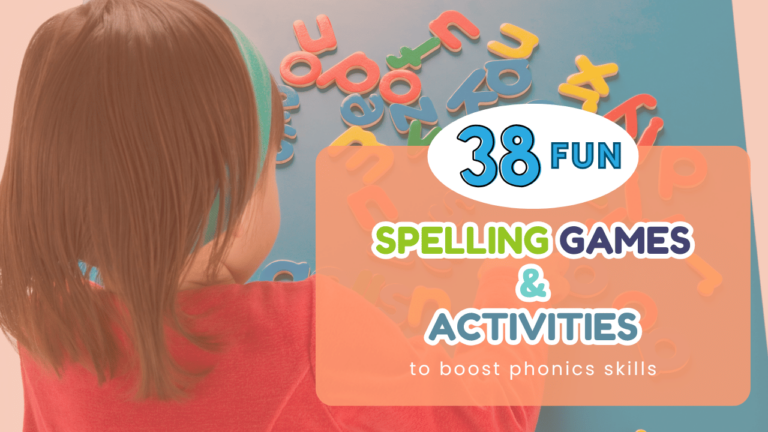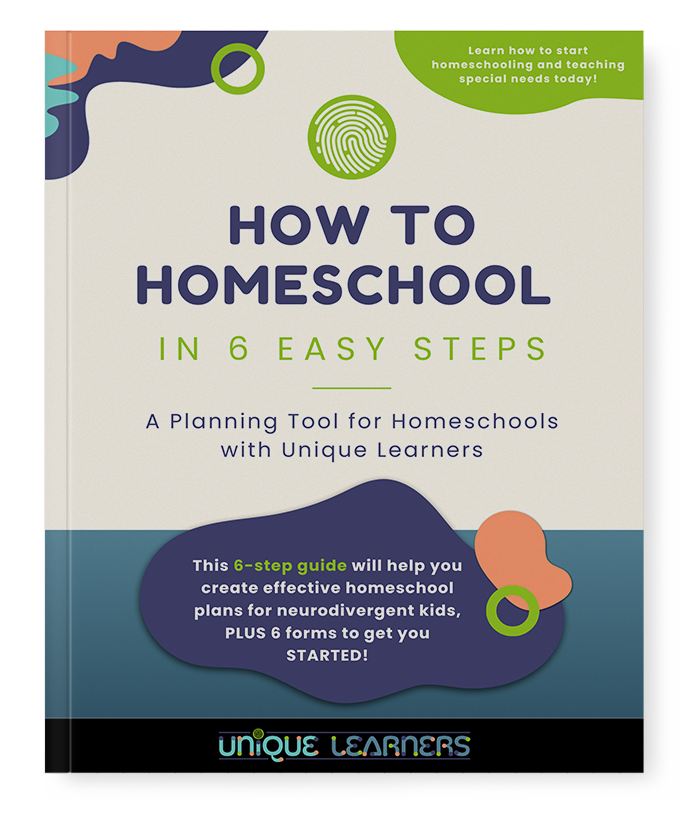In a world where screens and digital distractions dominate, the challenge of teaching children foundational skills like spelling and phonics skills becomes increasingly complex. But imagine a realm where learning these essential skills transforms into an adventure, bursting with creativity and excitement. This is not just wishful thinking; it’s entirely possible by harnessing the magic of fun spelling games and activities. These engaging activities are not only educational but also captivating, as they turn the mundane task of memorizing words into a delightful journey filled with laughter and discovery.
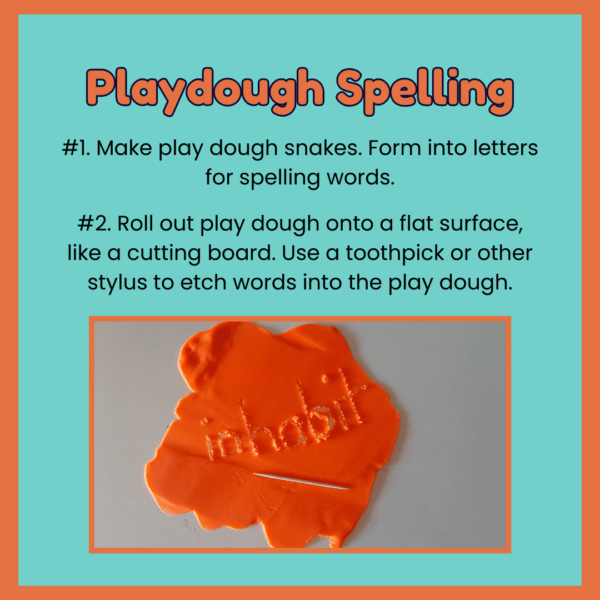
I have found over the years that a predesigned random list of words, writing them three to five times each day, and taking a test at the end of the week does very little for helping kids with dyslexia, ADHD, and autism to learn spelling words. Instead, students’ eyes light up as they match letters to sounds, weave together words like puzzle pieces, and engage in friendly competition that both entertains and educates.
Through innovative games and activities designed to get kids hands manipulating and bodies moving, children can explore the rich tapestry of language, enhancing their literacy in a way that feels more like play than work. I hope you find some exciting ways to have your kids practice spelling!
The Power of Play: Why Fun Spelling Games Matter
One of the key advantages of fun spelling games is that they help children develop a positive attitude towards learning. When kids associate learning with enjoyment, they are more likely to approach new challenges with enthusiasm and curiosity. This positive mindset can significantly enhance their ability to absorb and retain information.
Fun spelling games provide a hands-on approach to learning. Instead of passively memorizing words, children actively participate in activities that require them to think critically, problem-solve, and apply their knowledge in practical ways. This active engagement stimulates their cognitive abilities and helps them develop essential skills such as logical thinking, pattern recognition, and vocabulary expansion.
Visual Spelling: Training Eyes to Look at Words
One of the issues in having kids learn spelling is to engage all of the input modalities. Many kids with language based learning issues have difficulty attending to print and really looking at the patterns in spelling words. In fact, some just have a hard time looking at a piece of paper with words on it!
Although kids with more severe dyslexia or visual processing difficulties may struggle with many word puzzles, smaller puzzles with larger print can actually enhance visual tracking, scanning skills, and word retrieval skills.
- Start with a magnetic tray, single index card with a large word in purple or blue marker, or short list of no more than five words written in large letters. Have your child look at the word, say the letters, and gather the letters on their magnet tray to “copy” the word and sequence the letters in the correct order.
- Puzzles, like crosswords and word searches, can be very difficult for kids with language-based learning issues; however, starting with simple puzzles can help boost visual processing, scanning, and vocabulary skills.
Auditory Spelling: Activating Ears to Listen to Sounds in Words
The main principle to multisensory learning is to combine as many sensory input modalities as possible. Hearing and speaking aloud is an important aspect of improving spelling for kids with dyslexia and autism. The more you can integrate seeing, hearing, and doing, the more spelling progress you will notice.
- Auditory input is super important for kids who struggle in spelling. If your child is nonverbal, you can say the word, letter names or sounds, and say the word again. If your child has any expressive language, encourage speaking the word and letters if possible. If your child is verbal, start by saying the words and letters with your child. Gradually, encourage your child to spell their words aloud. Of course, start with a visual form of each word and remove the cue as practice continues.
- Music has a magical way of capturing children’s attention and making learning fun. Phonics-based sing-along activities leverage the power of music to reinforce concepts and improve spelling skills. You can find a ton of spelling songs on YouTube by searching “spelling songs” or other keywords, like “syllable rules songs.”
Tactile Spelling: Engaging Hands and Storing Memories
Tactile activities make it easier to have your child practice indoors and independently. Tactile activities are my favorite ways to get kids involved in spelling!
To maximize the educational benefits of tactile fun spelling games and activities, be sure to provide a visual sample of each word or a very short list of no more than five words. If possible, write them on white or yellow index card or whiteboard with purple, dark blue, or red thick marker. Then have the child say the word, spell the letters, and say the word again aloud. Finally, do something with that word that involves a fun art medium or tactile sensory practice activity.
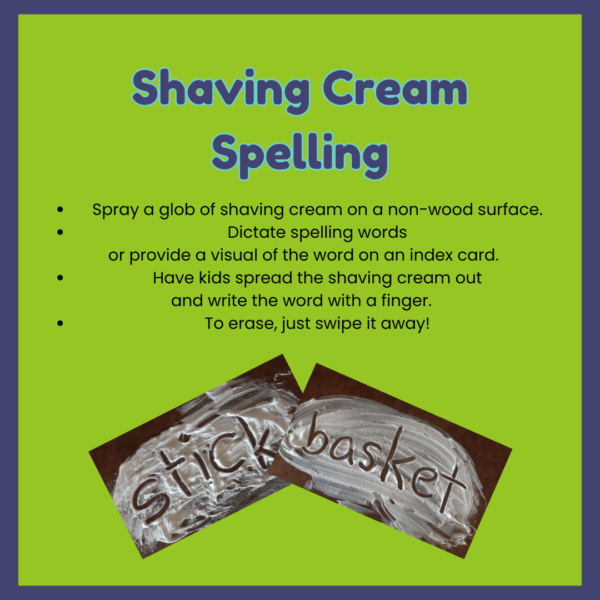
Here are some of my favorite tactile fun spelling games and activities to do with fingers, hands, or even elbows:
- Shaving Cream Spelling – Kids LOVE doing fun spelling games with shaving cream, and it helps to clean surfaces that needed a good scrubbing. Warning. Don’t use shaving cream on a wood table. It will damage the coating. Glass, plastic, or laminate table surfaces are perfect!
- Rice Tray – Make it in a 9×13 baking pan or plastic teacher bin. It needs a flat bottom. You can color the rice or not. If you need more contrast underneath the rice, place a piece of colored construction paper and then add about a half inch of rice.
- Sand Tray – Make a sand tray the same way as a rice tray. I use colored crafting sand in my kid’s favorite color. I’ve seen on social media to use salt. I don’t use salt because many of my students are nail biters, pick skin, or have hang nails. Salt stings open wounds in skin!
- Oil Pastels (Craypas) and Watercolor Wash
- Artist Chalks
- Watercolor or Tempera Paints
- Paraffin Wax, White Crayon, or an Old Candle. Write on White paper. Next day, have your child scribble over the paper with regular Crayola thick markers to reveal the words or do a watercolor wash with a seasonal color, like orange for October or red in December.
- Secret Code Spelling. Use lemon juice and q-tips on white paper to write spelling words. Later, hold the paper over a heat source, like a candle or iron. Of course, adult supervision is needed for this one! The lemon juice oxidizes and turns brown to reveal the words.
- Little Electronic Writing Tablet. These can be ordered on Amazon or another website. Have your student write with a stylus, split syllables, or circle rules. Then press a button to erase.
- Magnadoodle. This is similar to a little electronic tablet, but often Magnadoodles are larger for kids who need a larger writing surface.
- Glue Letters on individual cards
- Sand paper Letters on individual cards
- Bumpy Plastic Letters or Montessori Wood Letters
- Cut out Magazine Heading Letters. Have your child find the letters for spelling words. Make a small line of school glue and slide the magazine letters onto the glue line.
- Scrabble Tiles
- Letter Rubber Stamps
Kinesthetic Games: Move to Spell
Moving activities can be very effective in getting kids with extra energy to actively participate in doing spelling. You can do group games or individual activities that involve running around or whole body movement.
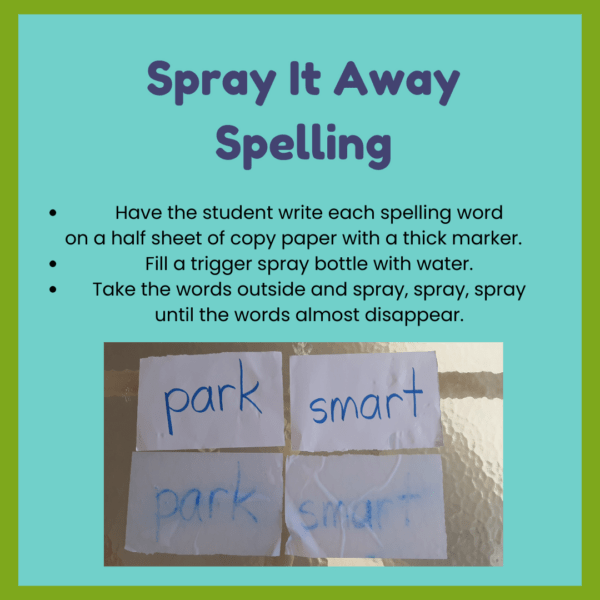
Here are some of my favorite kinesthetic fun spelling games and activities:
- Sidewalk Chalk
- Scavenger Hunt. Give your child an index card with a definition on it. Have your child go searching around the house like an Easter egg hunt to find a word that fits that definition. If a different word is found, have them leave it where it is. You can do this one as a group race.
- Run Around Spelling. Put the individual letters of each spelling word on a card or paper. Scatter the letter cards around the family room or backyard. Dictate a word to your child. Have your child run around to gather the letters for the dictated word. They should bring the letters to you and lay them out in front of you to spell the word. This activity can be done for grammar and sentences also.
- Sock Basketball. Give your child three words to spell. For each word spelled correctly, hand a rolled up sock. Place a small trash bin at a place as a basketball hoop. Once the child has socks to throw, have them see if they can make baskets. This can be done individually, but if you do it as a group activity. Each child can earn up to three socks on a turn to throw, but the points are for baskets made.
- Relay Races. Have kids line up in two even teams. Give the first players in line a word. Have them run to a white board or chalk board and write the word. Have them run back to the line and tag the next kid in line. Dictate the next word to the next kid in line for that team and the same word for the other team when they are ready.
- Hop Spelling. Place alphabet circles or squares on the floor. You can purchase velcro spots or make a paper alphabet. Either you or your child can assemble the spots together for a spelling word. Have your child tap the letters while segmenting the sounds and blending the word by swiping their foot across the spots.
- Carpet or Grass Tapping. Have your child wear socks or barefeet. Dictate a spelling word. Then have your child write the word with their feet in the carpet or grass. You may not be able to see the word, so be sure to watch and have your child say the letters as they foot write.
Digital Delights: Online Fun Spelling Games for Kids
In today’s digital age, online fun spelling games offer a world of possibilities for children to enhance their phonics skills. These virtual adventures provide an immersive learning experience that combines interactive gameplay with educational content.
- One spelling game website that’s free is Spelling Training. You can type in your word list and then select a variety of activities for your child to do. Here’s the link: https://www.spellingtraining.com/
- Toy Theater is another website that has easy to use games and activities for spelling and phonemic awareness. Here’s the link: https://toytheater.com/category/teacher-tools/virtual-manipulatives/literacy-tools/
When selecting educational apps for spelling success, it’s important to choose those that align with the child’s age and skill level. Additionally, look for apps that provide clear instructions, interactive features, and opportunities for independent practice.
Creative Spelling Stations: Rotating Fun and Learning
Spelling stations are an excellent way to keep children engaged while providing them with a variety of hands-on activities. By setting up different stations around the classroom or home, kids can rotate between activities that reinforce phonics skills in creative ways.
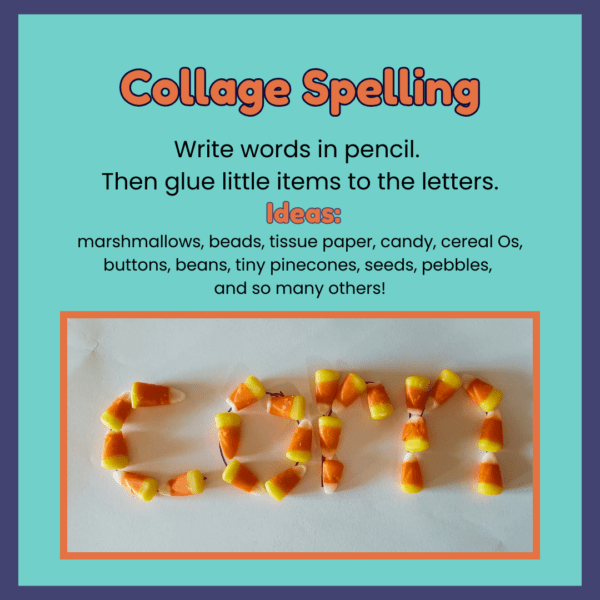
- For example, one station could involve building words using magnetic letters or letter blocks.
- Another station might focus on creating word collages by cutting out letters from magazines or newspapers.
- A third station could involve playing word-based board games or completing crossword puzzles.
- If you want to know if your children can spell every day objects, gather things from the kitchen, bedrooms, or other places around the house. Put them on a table as a center and provide paper and fun markers or pencils. You can even have your kids draw the objects and write the word from memory or write the word in a sentence. If your kids need a visual cue to practice before using the items in a center, place word labels around the house for a week or so before creating your spelling center.
- You can start a Word Wall. When one of the kids asks how to spell a word, write it on a poster board on the wall. That way, the words they want to use in writing can be posted for the future. Use the Word Wall words for spelling practice.
- If you want to help your children keep track of what activities have been completed, you can make a check off grid of five to ten sections. Write an activity or game you’ve prepared on the grid. Your child can cross off the activities as they are completed so that each day they do a different activity or game to keep spelling practice fresh.
The key is to offer a range of activities that cater to different learning styles and interests. This allows children to explore various approaches to spelling while keeping the experience fresh and exciting.
Beyond the ABCs: Exploring Advanced Spelling Techniques
Once children have mastered the basics of phonics skills and spelling, it’s important to challenge them with more advanced techniques. This helps expand their vocabulary, improve their understanding of complex phonetic patterns, and develop higher-level thinking skills.
- Syllable Rules. Teaching young readers how to split longer words into syllables can help, not only with decoding, but also with spelling.
- Morphology. One technique is teaching children about prefixes and suffixes. By understanding how these word parts can change the meaning of a word, children can expand their vocabulary and improve their spelling accuracy.
- Homonyms. Another advanced spelling technique is introducing homophones and homonyms. These words sound the same but have different meanings or spellings. By exploring these linguistic nuances, children develop a deeper understanding of language and enhance their spelling skills.
All of these advanced spelling rules and words can use the same multisensory activities as listed earlier. You did favorite activities when your kids were at earlier stages of phonics skills and sight word development, so now is a time to try a new activity. Think of how you can integrate seeing, hearing, and writing or moving in fun ways.
Additionally, consider the child’s interests when choosing fun spelling games. If they have a particular passion for animals, incorporate animal-themed activities into their practice sessions. By aligning the games with their interests, you can enhance motivation and engagement.
Conclusion: Making Learning Engaging with Fun Spelling Games
In conclusion, fun spelling games are not just enjoyable pastimes; they are powerful tools for enhancing phonics skills and fostering a love for learning. By infusing entertainment with learning, these games captivate children’s attention and create an environment where learning feels like play.
Whether through interactive word puzzles, virtual adventures, creative activities like scavenger hunts, sing-alongs, hands-on artistic activities, or fun spelling games offer countless opportunities for children to engage with language in exciting ways. These games not only improve phonics skills but also promote critical thinking, problem-solving abilities, teamwork, creativity, and vocabulary expansion.
By crafting a game plan tailored to each child’s needs and interests, parents and educators can ensure that spelling games are both educational and enjoyable. So let the power of play unleash the full potential of children’s phonics skills, transforming learning into an adventure filled with laughter, discovery, and lifelong love for language.
Grab your FREE e-book guide to revamp your homeschool for success!
Are you new to homeschooling, or just wanting a fresh start? Download our FREE “How to Homeschool in 6 Easy Steps” guide and get valuable insights from Sue’s 30+ years of experience as a special educator and homeschool mom of 4!
Want to know about new products and blogs?
Join our email newsletter to be the first to know about a new homeschool and special needs blog, and new products from our shop! Sign up for only the newsletter, or grab your FREE “How to Homeschool in 6 Easy Steps” guide and you will also be added to the newsletter!
Also, join our Facebook group!
Join our new “Homeschool Help for Special Needs” Facebook group! It is a place for homeschool moms to ask questions about homeschooling a child with special learning needs, share teaching and curriculum ideas that have worked (and those that bombed), and be real about the unique challenges of homeschooling with special needs. If you want to join us, be sure to answer the member questions to help us keep this private group secure. Join us now!
